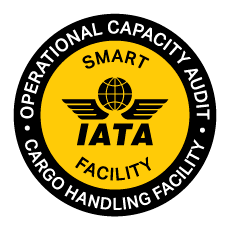Prove cargo operation compliance and capabilities

To do business with airlines, your cargo handling facility needs to show that you meet air transport industry standards and best practices. In the past, the only assessment of your capabilities was through an audit by each customer airline, causing interruptions to your operations. Additionally, with hundreds of handling companies carrying out cargo operations in thousands of airports worldwide, the competition to attract airline attention was fierce.
The Smart Facility Operational Capacity (SFOC) certification, introduced on the recommendation of the IATA Cargo Handling Consultative Council (ICHC), who maintain and update the IATA Cargo Handling Manual (ICHM), enables cargo handling companies to stand out from the crowd, and reduce the number of audits airlines carry out, as well as their scope. SFOC validates each facility’s compliance with IATA’s cargo handling standards, covering equipment, infrastructure, and procedures.
Take your cargo handling business to the next level
- Attract and retain new customers - The SFOC certification builds trust in your cargo-handling operational capabilities and processes, raising your company's profile and providing visibility to your facilities, equipment and infrastructure, through our One Source directory.
- Raise the bar for quality and efficiency at your company - The certification process benchmarks your cargo handling processes and procedures against industry standards, enabling your organization to implement best practices and increase staff efficiency, leading to enhanced operational capacity.
- Sharpen the focus on what matters most - The SFOC certification enables airlines to reduce their audit frequency, and limit its scope to unique services, and safety and security aspects, meaning your staff can focus on getting the job done.
The certification affirms SATS’ consistent standards and the quality of our service. We hope other airlines will follow this example to realize the SFOC program's full audit efficiencies for the entire industry.
– Yacoob Piperdi, CEO, SATS Gateway Services
Ensure all your handling operations are up to standard
The Smart Facility Operational Capacity (SFOC) certification assesses your organization based on the Smart Facility Standards Manual (SFSM), which is part of the IATA Cargo Handling Manual (ICHM), and covers the following areas:
- Generic cargo capabilities - This is a mandatory assessment for all cargo handling facilities, whatever your specialization.
- Optional dangerous goods specialization - Adhering to the Dangerous Goods Regulations (DGR), and leveraging CEIV Lithium Batteries where applicable.
- Optional temperature-sensitive specialization - Adhering to the Temperature Control Regulations (TCR), and leveraging CEIV Pharma where applicable.
- Optional perishable goods specialization - Adhering to the Perishable Cargo Regulations (PCR), and leveraging CEIV Fresh where applicable.
- Optional live animals specialization - Adhering to the Live Animals Regulations (LAR), and leveraging CEIV Live Animals where applicable.
- Optional ULD specialization - Adhering to the ULD Regulations (ULDR).
A successful certification based on the SFSM confirms the facility conforms and adheres to IATA's Resolutions and Recommended Practices, attesting baseline capacities to handle general cargo and applicable special cargo commodities.
Be supported every step of your SFOC journey
The IATA Certification process is designed to guide and support you to success. We give you the understanding, tools and expert advice you need to achieve your organization's certification. The process is as follows:
- Self-assessment - Once your key staff are trained, guided by our team, they complete a self-assessment questionnaire, ensuring all materials, evidence and documentation are available to the IATA assessor. If a service or process is outsourced, the facility operator must provide the latest contract/SLA. At the end of each Smart Facility Standard the “Company Operations Manual Reference” section allows the auditee to list the reference(s) to their company operational procedure manual sections and extracts to facilitate the documentation conformity check during the audit.
- Document review - The IATA assessor reviews all documents submitted to prepare the on-site phase of the assessment process.
- On-site assessment - During a period of three (3) to four (4) days, the assessor will visit the facilities to observe that the current operations, processes and procedures of the organization are conducted along the same lines as described in the various documents provided by the organization, and that they conform to the SFOC audit checklist requirements. For each Smart Facility standard, the assessor indicates if the procedure has been observed, documented and/or implemented. The assessor will then provide comprehensive feedback, including a gap analysis report and a detailed list of the specific findings and areas of improvement, to enable your organization to make the necessary adjustments.
- Validation - The assessor works in close cooperation with your organization to ensure that all feedback is actioned. Your organization will need to provide a corrective action plan (CAP) specifying the actions you have taken and that are planned, together with an implementation date. The CAP is validated by the assessor as meeting SFOC certification criteria. As your organization executes its plan, you must submit clear evidence of its full implementation to the IATA assessor for validation. Once the CAP has been satisfactorily implemented, the assessor will issue the IATA Assessment Report, and your organization will be granted the IATA SFOC certification.
- Re-certification - To maintain your SFOC certification, a new assessment will be carried out to check compliance with the certification requirements and continuous improvement.
Talk to a certification expert today to find out how we can help you ensure you're up to standard.
Note: IATA Certification does not handle the IATA accreditation program. If you are a travel agent or cargo agent, please visit the customer portal to get support regarding accreditation services and training.